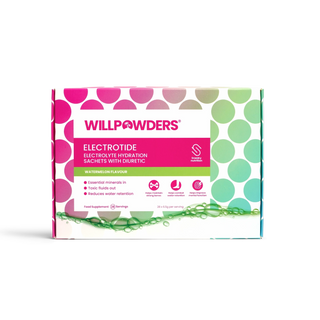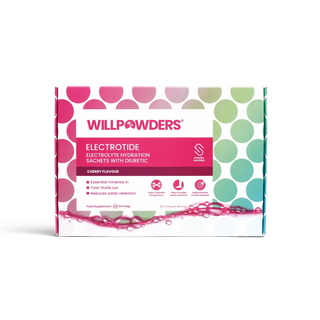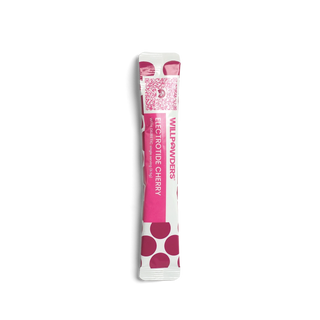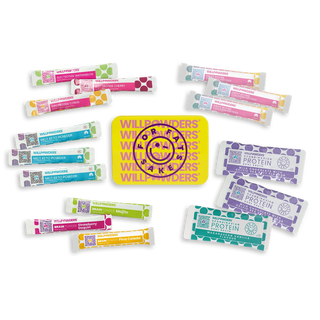
Body and Brain
Protein Powder: Unmasked
What's in Your Protein Powder?
WillPowders lives and breathes clean living; counting chemicals and not calories; nourishing, energising and hydrating with the cleanest and most dense sources of nutrition available; eating like our ancestors and fuelling our bodies with good fats to support nutrient absorption, brain health, hormonal balance, satiety and general physical well-being.
At WillPowders, we fervently believe that all of the above should be a priority for you and your family. Why? Because your body deserves the best. Feeling your best and looking after your longevity shouldn’t play second fiddle to anything because without a nourished body, what is life? We understand that some of what can make you feel great often comes at a cost, but when we feel sub-par, it impacts everything, from how we enjoy those little pockets of happiness to dealing with the trials and tribulations that life can throw at us. It’s an investment in the really important stuff, which is why nothing infuriates us more than when health and supplement brands flog you a lie!
An Uncovering of the Truth...
We have conducted a deep dive into the most popular and most frequently purchased protein powders in the UK and international market and what we have uncovered is simply not okay; we won’t stand for it and nor should you!
So…here we go, let the ingredient naming and shaming begin!
In googling the top, most popular protein powders in the UK, I accidentally became an ingredientologist (an actual job that exists in Big Food. The job role entails playing around with synthetic ingredients to get you hooked on their products, resulting in you becoming an Ultra Processed Food addict) so that I could understand half of what is in them. It aint food, let me tell you! Comparing the protein formulas with WillPowders’ Protein Powder made my brain hurt and required a lot of MCT Oil and Brain Powder to keep me going down the laboratory’s rabbit hole. Knowing that WillPowders’ protein powder only contains 5 natural ingredients really was like a holiday for my neurons.
It aint a Pretty Picture!
What was really alarming, was that the top 5 protein powders derived from plant based proteins or whey, the watery part of milk when separated from the curds. Whilst whey is an animal derivative, which, as you know, at WillPowders we advocate, there was no information available pertaining to its origin; therefore, making conscious consuming difficult. In addition, whilst whey seemed to be the main source of protein in lots of the most popular protein powders, what it is mixed with to provide a drinkable source of protein has never seen a blade of grass or morsel of sunlight. We have discussed the issues we have with plant based proteins before in our Protein Minefield blog; however, here is a condensed list: it’s not bioavailable; crops are massed produced using GMOs in places like China because it is illegal in the UK (and for good reason); it can wreak havoc on your gut and it’s often blended with inflammatory seed oils, artificial sweeteners and emulsifiers.


Clean versus not so Clean...
Knowing that we have formulated the cleanest protein powder on the market, I have no shame in unveiling what’s behind the protein powder mask, a mask that has been made highly attractive by clever marketing, some celebrity endorsements and the hope that you, the consumer, won’t read the ingredients lists. Therefore, I have done it for you!
I have selected the most commonly used ultra processed ingredients which are used across the most popular and best-selling protein powders, powders that claim to nourish your body, provide you with a full amino acid profile, will help you with your gains or assist in weight loss. They can claim it, but it doesn’t mean you should believe it.
Naughty Naughty!
Upon scouring protein powder sites for their ingredients, it became so obvious that some companies were trying to hide them. There was no clear ‘ingredients’ click, instead prefacing their laundry list of ingredients with ‘nutritional information’. Nutritional information is very different to knowing what is in a product, hence why at WillPowders we have both of those buttons for every product! Anyhow, I am willing to forgive this oversight, but I’m not so understanding when it comes to their use of Sunflower Oil, Guar Gum, Xanthan Gum and Sucralose, to name a few… Not only this, an awful lot of the ingredients used in their “protein” powders come from carbohydrates, which simply doesn’t compute in my brain - let’s call a spade a spade, WillPowderers! A carbohydrate is a carbohydrate, not a source of protein.
Between 3 and 5 out of the 5 protein powders I reviewed also use these ingredients in their self proclaimed ‘magic’ powders, but here’s what you need to know and how they can impact your body.


Guar Gum
This is a food additive commonly found throughout the food supply chain. It's made from legumes called guar beans and is a type of polysaccharide (a long chain carbohydrate), composed of two sugars called mannose and galactose. Therefore, it has the power to spike your insulin, leaving you searching for the snacks. Guar gum is frequently used in many processed foods because it's soluble and can absorb water, forming a gel that thickens and binds products.
Whilst it has a high fibre content, which may support digestive health, it can also lead to gastrointestinal side effects such as gas. ‘In the 1990s, a weight loss drug called “Cal-Ban 3,000” hit the market. It contained a large amount of guar gum, which would swell up to 10–20 times its size in the stomach to promote fullness and weight loss. Unfortunately, it caused serious problems, including obstruction of the oesophagus and small bowel and, in some cases, even death. These dangerous side effects ultimately led the FDA to ban the use of guar gum in weight loss products.’ The FDA has specific maximum usage levels for different types of food products, and whilst I am sure that protein companies stay within these limits, it does feel like they are playing with fire. In addition, Guar Gum may cause diarrhoea and loose stools. Perhaps this is why they think it aids with weight loss - healthy! In addition, it can lower blood pressure, which may be hazardous for individuals with pre-existing low blood pressure. Guar Gum is not just found in UPF, but also in cosmetics, medications, textiles, and paper products. Yummy!
Xanthan Gum
Xanthan gum is a polysaccharide, another type of carbohydrate (Yey! Another insulin spiking ingredient!), commonly used as a food additive. It is produced through the fermentation of sugars by the bacterium Xanthomonas campestris. Xanthomonas campestris is a Gram-negative bacterium that causes black rot in plants, so why the hell would you ever want to put it in your mouth?
It is commonly found in UPF food as it is known for its ability to create viscosity and act as a thickening agent. It is frequently used in the food industry to improve texture, stabilise emulsions, and prevent ingredients from separating. Some people may experience digestive issues, such as bloating or gas, especially when consuming large amounts, but knowing it is a fave in the world of UPF should be the only reason you need to steer clear.
One piece of research I found investigated the effects on animals, adults and infants, and whilst it can cause gastronomic discomfort in animals and adults, the study suggested that xantham gum was highly dangerous for infants:
‘Xanthan gum relates to the development of necrotizing enterocolitis (NEC) in infants…the New York Times published an article relating the tragic deaths of infants who had developed NEC after consuming a diet of formula or breast milk that had been thickened with a xanthan gum-based product called SimplyThick. This product was widely used in hospitals to thicken feed for infants with swallowing difficulties.
Two papers reviewed the cases of xanthan gum-associated NEC, and while there isn’t enough data to establish causation, the general consensus seems to be that the xanthan gum caused increased bacterial production of SCFA in the newborns’ intestines, and this contributed to the development of NEC’


Keep the Carbs coming…
Maltodextrin, a common additive in processed foods, has sparked both curiosity and concern and no one is more concerned than us! Maltodextrin is a white powder derived from corn, rice, potato starch, or wheat and despite its plant origin, it undergoes intensive processing. The process involves cooking starches and adding enzymes to break them down into a water-soluble, neutral-tasting powder. Ultimately, it’s another carbohydrate which causes rapid blood sugar spikes, which can be really dangerous for diabetics, but also those who are desperately trying to get a hold of snack seeking behaviour!. When we spike our blood sugar, we say goodbye to our control! Used as a thickener or filler in processed foods, Maltodextrin increases a product’s volume and extends its shelf life, meaning what you’re actually paying for is mainly synthetic and chemically bulked protein powder. Furthermore, some studies link maltodextrin to inflammation and gut dysbiosis as well as putting you at a greater risk of obesity. I’m fairly convinced that your decision to consume a protein powder is to avoid all of this, so…
Oat Flour
Oat flour is used as a natural thickener and texture modifier across many protein powders. Whilst oats are largely believed to have multiple health benefits, here’s why we’re not oat’s biggest fan. Oats are yet another carb, (give us strength!) that can play havoc with your insulin levels, but they can also cause gastric swelling, leading to abdominal cramps and bloating. In addition, they can severely impede your body’s ability to absorb iron, resulting in anaemia. Not so shiny and brilliant now, are you, oats?
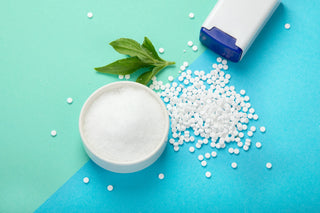

Let’s talk Sweeteners!
Sucralose, oh the ‘lose’ in the food world! If ingredients are suffixed in this way, run a mile!
Sucralose is a low-calorie artificial sweetener which is 600 times sweeter than sucrose (table sugar) and it is widely used as a sugar substitute. While it is generally considered safe for most people when consumed in moderation, some individuals may experience side effects such as headaches, digestive issues, or allergic reactions. Some studies suggest that artificial sweeteners, including sucralose, might also influence cravings, resulting in you fuelling your body with what you have been led to believe will help you feel satiated. It’s just such a contradiction and the biscuit tin will never lose its appeal.
Many of the protein powders that are rated the best use glucose syrup which is a sweetener made from breaking down glucose molecules in starchy foods, such as corn, potatoes, or wheat. It is used in many commercial foods to enhance their sweetness, texture, and to support shelf life, preventing spoilage and microbial growth. We get it, they want their products to last, but at what cost to your health?
Some have opted to use Acesulfame K as its artificial sweetener. Whilst it is 200 times sweeter than sugar, it can cause allergic reactions, headaches, or digestive issues, but the real reason to avoid it like the plague is its power to cause inflammation, cancer, or metabolic disorders..
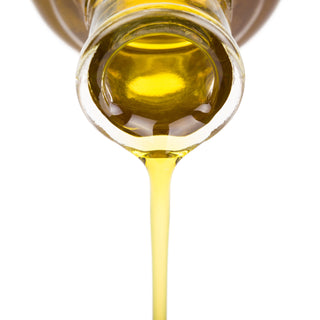

Sunflower, Rapeseed and Palm Oils
Sunflower, rapeseed and palm oils are fatty substances extracted from plants and seeds. They contain phospholipids, such as phosphatidylcholine, phosphatidylinositol, and phosphatidylethanolamine and whilst the body needs these to transport lipoproteins, these oils are high in Omega 6 fatty acids, which can cause chronic inflammation and therefore, various health issues including heart disease, diabetes and cancer. At WillPowders, we know that there are much better options like Olive Oil, butter, ghee and avocado oil, optimum sources of fat that support the good cholesterol (HDL) that helps keep your heart healthy. Which is exactly why we have used the goodness of butter in our protein powder. Highly processed, these Omega 6 fatty acids are used as emulsifiers, helping to blend ingredients that would otherwise separate, like oil and water. Sunflower oil, in particular, is commonly used in industrial applications (mainly to clean agriculture equipment). Not only are these seed oils highly inflammatory, you could find yourself in gut hell and experiencing allergic reactions. For more information pertaining to what type of fat you should be consuming, check out our blog; Fat. The Good, the Bad and the Ugly.
Throwing you off the UPF Scent...
Many of the protein powder companies have tried their best to hide the truth. Upon clicking on their ingredients list, in some cases, it reads ‘Pure Whey Isolate' as its main ingredient. 'Outside of that, we add as few ingredients as possible; only those which are needed to make the shake look and taste amazing.’ Oh really! Let’s see, shall we…
Riddled with Xantham Gum and Sucralose, some protein powder also uses Soya Lecithin, which can cause allergic reactions and digestive issues. Not only this, the use of certain solvents, yes, SOLVENTS can exacerbate adverse biological reactions in the extraction process of Soya Lecithin. I mean, FFS! Knowing that this “ingredient” is potentially contaminated with solvents should be enough to make you run for the natural hills!
Now, you may get lucky and your body may survive the inadvertent solvent abuse, but do you want to risk insulin resistance and increased liver fat, which can be caused by the conjugated linoleic acid found in some protein powder? Or what about the use of gellan gums which may cause digestive issues, such as gas, bloating, or diarrhoea; or perhaps the interference with the absorption of some minerals, such as iron, calcium, and magnesium, as it binds to them in the gut? No? Didn’t think so!
Don’t even get me started on the use of Carrageenan, which is a natural substance extracted from red seaweeds. Some studies suggest that carrageenan may cause inflammation, digestive problems, and even colon cancer in animals and humans. Used as a thickener and stabiliser, it’s a ticking time bomb just waiting to explode. Whilst you could argue that Carrageenan derives from nature and should be fairly risk free (it’s not), the use of Polydimethylsiloxane, on the other hand, is a different matter!


Poly-what-a-xane?
Polydimethylsiloxane (PDMS), also known as dimethylpolysiloxane, is a compound found in various products as well as some protein powders we looked at. Despite its ominous-sounding name, and it is quite the mouthful (literally!), there’s no definitive proof that PDMS poses an immediate health risk to humans; however, the production process involves various chemicals, some of which are considered less safe for human consumption. It commonly appears in grease, silicone lubricants, mould expulsion agents, polishes, bathroom caulk, and cosmetic products, as well as being a fave with the world’s most prominent fast food restaurant chains. How so-called “health food/ supplement” companies can knowingly use ingredients like PDMS in their products, ignoring the above and marketing their versions of protein powder as “good for you” is beyond us.
Is there still hope with their amino acid profile? Unfortunately not…because they just haven’t thought it through…
Methionine is an essential amino acid found in all protein supplements and it supports with maintaining a healthy metabolism; however, methionine depletes glycine stores (another amino acid which is responsible for the synthesis of collagen in the body). Plant based proteins do not contain as much glycine as protein that derives from animal sources; therefore, the intricate dance of amino acids and the body’s natural collagen production can be negatively affected when amino acid ratios are out of whack, which is unfortunately the case in plant based proteins. The impact? Inflammation; joint health, bone density and muscle integrity decline and ageing skin. So the next time you pick up a bag of plant based protein powder, maybe think twice. For more information on the importance of glycine, the unsung hero in our collagen synthesis, check out our ‘Unveiling the Hidden Marvels in Your Collagen’ blog.
The underlying and inescapable fact is, and something we shout from the rooftops everyday, when you fuel your body with chemicals, cravings take hold, biological responses are hindered and the blood brain barrier and gut- brain axis is jeopardised. What you allow into your gut has the power to determine everything, from how you look on the outside to your immune responses, weight management, how your body rids itself of toxins and most importantly, the chemical reactions in your brain. The truth is, if you fuel your body with chemicals, your brain has the power to rule the roost, impacting how much you move, how you feel and your decisions around food. Our mantra is, and always will be: feed the brain and the body will follow.
The toxic ingredients used in the most popular protein powders on market, compared to the 5 natural ingredients found in WillPowders’ Protein powders really is a shocker! We think it really is a no brainer: opt for natural and bioavailable over inflammatory, cancer inducing and gut destroying ingredients. Optimum health, both inside and out, starts in the gut, so it’s perhaps time to think about what you’re feeding yours.
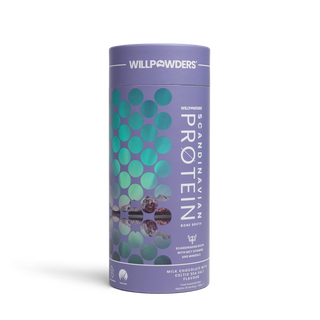

Natural Goodness
WillPowders’ Protein Powders contain 5 ingredients that all derive from nature. We have formulated the most delicious protein powders without the use of synthetic ingredients or UPFs, which will actually do what we claim they will do. Our bone broth protein comes from sustainable farming and is the most bioavailable source of protein nature has to offer. Your insulin levels are in good hands with our natural sweeteners and flavours, which we diligently select for optimum taste, ensuring that when we say they come from nature, they come from nature! Your cravings will be taken care of with our MCT Keto Creamer, good fat that will keep you satiated, helping you to achieve your health goals.
Versatility at its Best!
Our protein powders are so versatile and can be used in a plethora of high protein snacks that you and your kids will love. Explore our recipes for some inspiration and start finding your amino acid superpowers now! So what are you waiting for, ditch the lab and embrace the goodness of nature with WillPowders.
For more reasons to switch over to WillPowders’ Protein Powders, read our dedicated blog series on protein: The Best Protein Powder for Men – WillPowders, How WillPowder’s Protein Powder Saved Mine and My Son’s Life! – WillPowders, What is Protein and is it Important? – WillPowders
Recipes

Choccy Cookies
Zero sugar choccy cookies which are high in protein and keto friendly.

Chickpea Protein Cookies
These high in protein, quick and easy Chickpea cookies are such a winner!
Disclaimer
Our blogs are written with love in the hope that they go some way in helping you feel like the rockstar you are, and whilst we do our due diligence, research like maniacs and fact check our stuff, we know everyone’s journey is different. They are intended to educate and empower you, not usurp medical advice. We would never advise you to stop, adjust, or modify any prescription medication without the direct supervision of your healthcare practitioner, but don’t be afraid to talk to your doctor about your new found knowledge, brought to you by the marvels of nature because they don't know everything! Blogs are always informed by Davinia but often written by a member of the team. Not all blogs reflect Davinia's experiences and sometimes provide alternative perspectives

